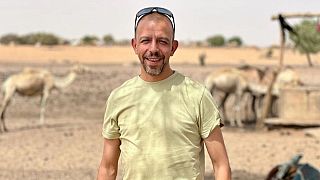Spain
Amidst growing numbers of young migrants arriving in the Canary Islands, Spain's parliament will vote on Tuesday on a proposed bill that would force other regions to take responsibility for some of the minors.
The children sometimes won't stop crying. Health workers dealing with migrants arriving on Spain's Canary Islands try to understand if the tears are from illness, injury or, as is often the case, from pure shock.
One young Senegalese boy who disembarked recently kept fainting every few minutes, troubling doctors who couldn't determine the cause. Other migrants finally explained: the boy had witnessed both parents die during the arduous boat voyage from West Africa. Their bodies were thrown overboard into the Atlantic Ocean.
“There's no medicine for that,” said Inmaculada Mora Peces, a 54-year-old emergency doctor who treats migrants arriving on the island of El Hierro.
Mora Peces is among a growing number of people sounding the alarm as the archipelago struggles to deal with thousands of teenagers and children traveling alone to the European Union territory from Senegal, Mali, and other African nations, fleeing poverty, conflict and instability.
Proposed legislation
On Tuesday, Spain's parliament will vote to consider a legislative proposal that would force other regions to take responsibility for some of the minors currently stuck on the Canaries in dire conditions.
The bill has sparked a national political crisis and there is no guarantee it will pass.
The conservative Popular Party, the leading opposition to Spain's left-wing national government, is torn. On the one hand, it is the junior member of the Canary Islands government and is being urged by its senior partner, the Canary Coalition party, to support the deal. On the other hand, the far-right Vox party, which rails against irregular migration and particularly unaccompanied minors, is threatening to withdraw from its coalition governments in other regions if the Popular Party accepts any deal to relocate underage migrants, even voluntarily.
Under Spanish law, the regional authorities where the children arrive are responsible for their guardianship. But the Canary Islands government says it is overwhelmed, with more than 5,500 minors — far above its capacity for 2,000.
A deteriorating situation
“It’s a humanitarian catastrophe,” said Francisco Candil, a regional government official in charge of social welfare.
Not only do the Canary Islands lack physical space, but the regional government is struggling to hire professionals trained to work with the young migrants on the islands located some 1,300 kilometers (800 miles) from mainland Spain.
As a result, the children and teenagers languishing on the islands are not receiving the protections they are entitled to under Spanish and European law, including education and healthcare. Spanish media have reported overcrowded centers as well as cases of abuse and mistreatment. On the island of Lanzarote, authorities have set up temporary tents to accommodate the new arrivals.
Candil warned that the situation is only expected to deteriorate as boats keep sailing from the coasts of Senegal, Mauritania and the Western Sahara to the Spanish islands just 100 kilometres (60 miles) from Africa's western coast.
Nearly 20,000 men, women and children have reached the Canaries so far this year, a 160% increase from 2023. And that’s even before the high season for migrant crossings begins in the fall, Candil added.
"Human beings, not goods"
Earlier this year, the EU signed a 210 million euro deal with Mauritania to stop smugglers from launching boats for Spain. But the deal has had little effect on migrant arrivals for now.
If the bill doesn’t pass for consideration in the Spanish parliament on Tuesday, “it would be a failure for Spain and Europe,” Candil said. With a population of 48 million people, it shouldn’t be difficult for regions in mainland Spain to cope with a few hundred children, he argued. The Canary Islands would still care for the majority of unaccompanied minors.
Spain's Ombudsman Ángel Gabilondo called Friday for urgent structural and legal reforms after visiting two shelters for underage migrants in Tenerife.
“It’s enough to go to a center to see the youth and feel their pain," Gabilondo said. "They have been in the centers for months and see no future. We are talking about human beings, not goods.”
Meanwhile, professionals like Mora Peces say they feel helpless in the face of so many children and teenagers who arrive in terrible conditions after the dangerous ocean voyage.
“Today I arrived at my shift and my colleagues were crying. Well, I started working and in the end I ended up crying too,” Mora Peces wrote on X last week, a tweet that has already gotten over 864,000 views.
Last week doctors tried to save a 2-year-old girl who arrived on a boat from Senegal with her 8-year-old brother and mother. The girl got separated from her family and died despite attempts to save her.
Mora Peces had to deliver the tragic news to her mother. The mother asked for a photo of her daughter’s body which Mora Peces asked the funeral home to send.
Increasing number of young children
While the vast majority of unaccompanied minors arriving are teenage boys, Candil and others say they are concerned by the increasing number of young children, particularly young girls, traveling alone — nearly 200 in the last eight months. “It's highly unusual,” Candil said.
The girls flee forced marriages, abusive relationships, persecution or simply seek a better life, explained Siham Khalifa El Abdi, of the SAMU foundation which runs shelters specifically for unaccompanied girls.
Among those under SAMU's care is a teenager who fled Mali due to her sexual orientation. During her five-month migration journey to Spain, she was assaulted and forced to have sex with older men in exchange for food.
“These girls are very damaged,” said Khalifa El Abdi.
Mora Peces, the doctor working in El Hierro, says she's horrified by the rhetoric used by some politicians in Madrid to discuss the issue, including the Popular Party and Vox who have called for the Spanish army and navy to be deployed to stop the migrant boats.
She hears politicians and even regular people calling migrants “rapists” and “criminals,” a view that she describes as being completely at odds with the reality of the “tiny people in dramatic situations” that she treats.
“What they are discussing at the parliamentary level, it seems like they are not children," she said. “As if they weren’t people.”











01:24
EU to seek tougher measures from Libyan authorities on Mediterranean migrant sea crossings
01:37
Kenyan police officer arrested after protests over blogger's death in custody
01:52
138 million child workers globally in 2024, number down from 2020
01:10
Burundians go to the polls in first legislative elections since 2020
00:54
Eleven Sudanese migrants dead after crash in Libyan desert
01:17
ECRI warns of persistent racial profiling in European law enforcement